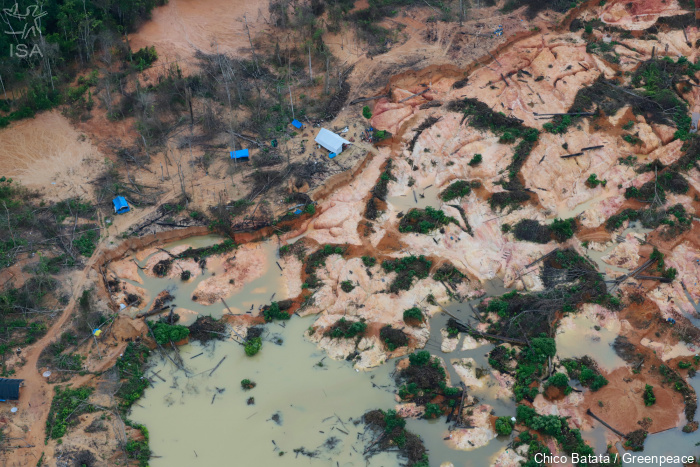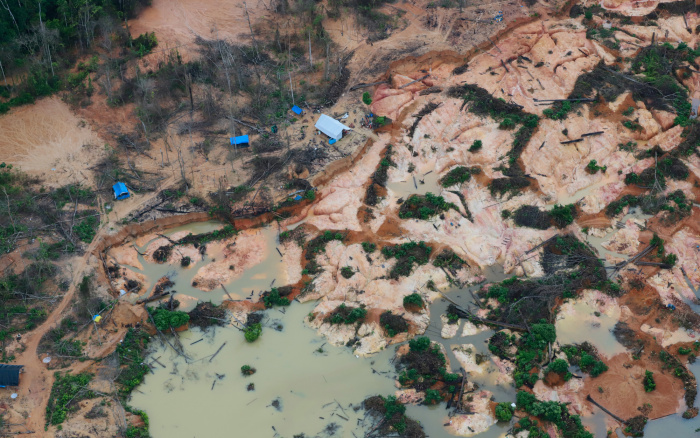Você está na versão anterior do website do ISA
Atenção
Essa é a versão antiga do site do ISA que ficou no ar até março de 2022. As informações institucionais aqui contidas podem estar desatualizadas. Acesse https://www.socioambiental.org para a versão atual.
"The footprints of the heart eater, the lung eater have now appeared"
Wednesday, 05 de August de 2020 
Esta notícia está associada ao Programa:
A young Yanomami woman recounts the advance of Covid-19 in her village due to the presence of miners. It has already taken her sister. The Hutukara Yanomami Association formalized a complaint to the authorities demanding action.
“So these footprints [from Covid-19] show what really happened. Today I'm thinking about it. There are no other tracks there. Today the body of my younger sister, with this disease, is suspended [as part of the Yanomami funerary ritual]. Earlier I thought she only had malaria. I thought that earlier, but now there are footprints of the heart eater, the lung eater.
This account, translated from Yanomami into Portuguese, is a short excerpt from the testimony of Y. Y., a young indigenous woman from the region of Mucajaí River, in the Yanomami Territory. She tells Hutukara Yanomami Association that her younger sister, aged 14, died earlier this month, a victim of Covid-19. Mucajaí River's area is one of the most impacted by mining.
As one of the Yanomami organizations leading the #MinersOutCovidOut campaign, Hutukara forwarded the testimony from Y. Y. to the authorities, with letters sent to the Federal Public Ministry, FUNAI and IBAMA.
According to the 2018 census conducted by the Special Indigenous Health District (DSEI Yanomami), Mucajaí River rgion has 306 people live spread across five communities. In her audio testimony Y. Y. describes the serious deterioration of the health situation in the region, which is facing an the increase in malaria and the arrival of Covid-19 as well as an increase in invasions by gold miners.
In her testimony, Y.Y. states: “This here, this disease [Covid-19] is very strong! This disease really kills! Many white people are dying from this disease! At the health clinic, the white people said that if this disease arrived in our land, we might die. And because they said that, we said: So when this disease arrives too, when it mixes with malaria, we may die! And as malaria doesn't end, if we continue to have malaria, we may die”.
The main vector of disease in the Yanomami Territory is illegal mining. A study by the Instituto Socioambiental (ISA) demonstrates that at least 40% of the Yanomami and Ye'kwana who live near mining areas could be contaminated by the new coronavirus. Given the urgency of the removal of the miners from their territory, the Yanomami and Ye'kwana Leadership Forum launched the campaign “Miners Out, Covid Out!” two months ago, which calls for the urgent removal of all of the illegal miners. More than 350,000 people have already signed the petition in support of the Yanomami and Ye'kwana people.
Yanomami leaders estimate that 20,000 gold miners are illegally within their territory. Each of them is a potential vector for transmitting the new coronavirus to the communities. In the words of Y.Y.: “Because of this, we continue to get malaria and because of this my sister got sick. She died. "Maybe it's malaria!" we said. And since it wasn't, when my daughter and I came here, we saw that it was this disease [Covid-19] after all. We always get malaria, we control / inspect the medicines. So now I understand about this disease, I'm thinking straight. ”
Out of the 15 mining areas being monitored by Hutukara, Mucajaí River area has the third largest degraded site, totaling 359 hectares. Along with the Waikás region, is where gold mining was most intense in the period from February 2019 to June 2020.
The violence of the miners, who harass, rape, exploit and encourage the prostitution of indigenous women, spreading diseases and promoting drinking alcoholic beverages, was also described by Y.Y. “So this is what the gold miners do: Back at my house, they come in bringing alcohol, very strong alcohol! They bring alcohol with them, they want to make friends, and they call women. They say, "hey, my woman!" and they sleep [with them]. This is how they do it! And because they started doing it, we get their diseases. We eat, we also go to their homes, so we also get malaria”.
Formal Complaint
The Hutukara Yanomami Association filed a formal complaint with the Federal Public Ministry (MPF), Federal Police, IBAMA and FUNAI. According to the complaint, which presents Y. Y's testimony in its entirety, the situation described by her is not new and “indicates a situation of constant threat to the indigenous people of the Yanomami Indigenous Territory, while miners move freely throughout.”
In their complaint, Hutukara states that of the 319 cases of Covid-19 registered by the Ministry of Health among the Yanomami and Ye'kwana, 55% of the cases - a total of 174 – are from community transmission. Hutukara makes a strong appeal: “Every day it is more critical for the authorities to take effective measures to remove all of the miners who are invading our land and prevent the Xawara from continuing to spread among us!”.
Translation: Christine Halvorson
Evilene Paixão
ISA
Imagens:




